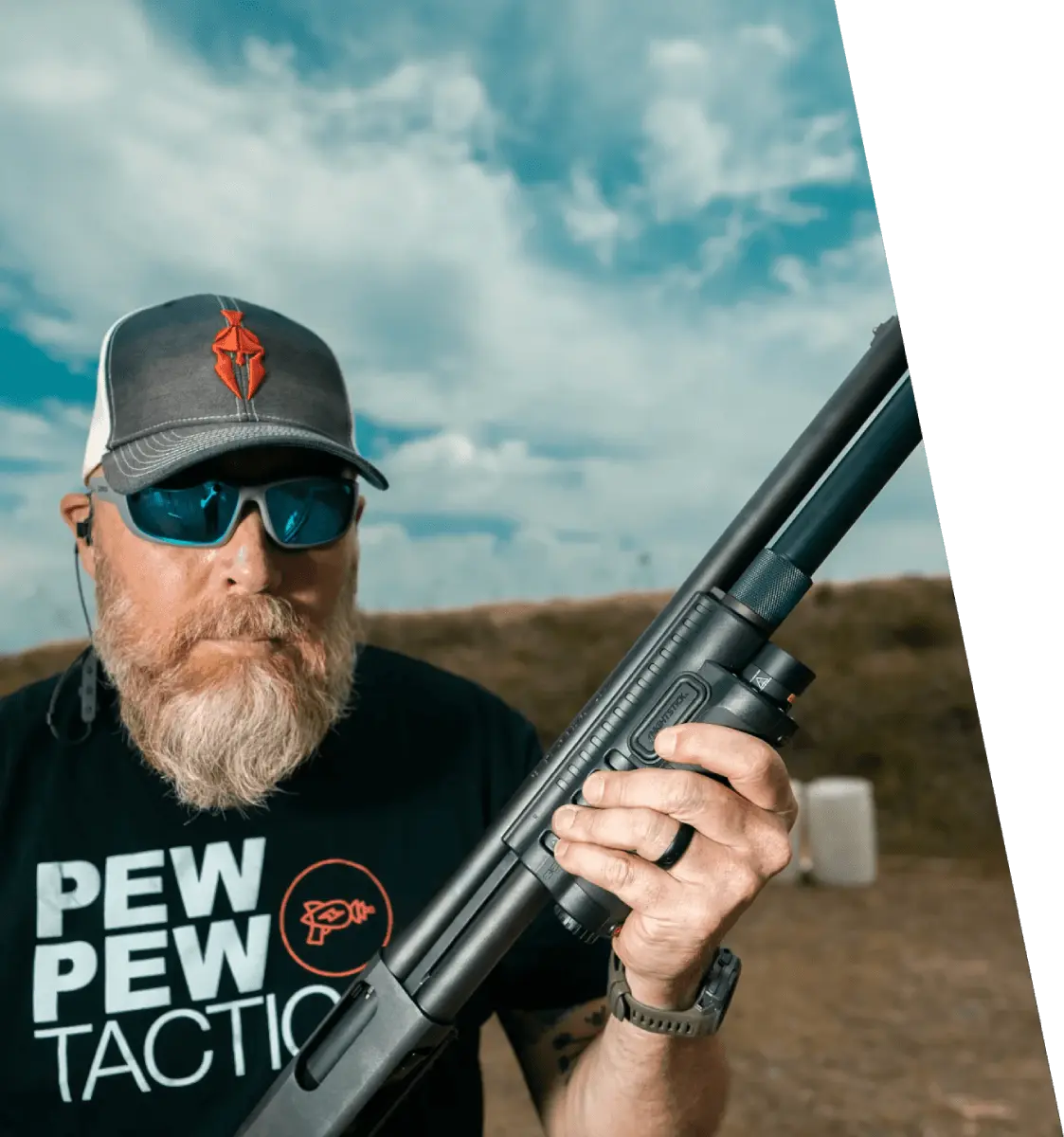Last Updated: July 10, 2025
Disclaimer: While the information provided here is legal in nature, it is not to be construed as legal advice and is for educational and entertainment purposes only.

Introduction
As one of the most gun-friendly states in the nation, Arizona presents few hurdles or headaches for law-abiding residents wanting to exercise their Second Amendment rights.
Buying, owning, and using a gun in the Grand Canyon State is easier than almost anywhere in the country. Keep up the great work, Arizona!
Of course, no state is perfect, so we’ll go over all you need to know about buying and using firearms in Arizona.
Table of Contents
Loading...
Snapshot Summary
- Permit to Own/Purchase a Firearm: No
- Permit to Own/Purchase Ammunition: No
- Firearm Registration Requirements: No
- Firearm Restrictions/Bans: No
- Magazine Restrictions/Bans: No
- Other Restrictions/Bans: No
- Safe Storage Laws: No
- Concealed Carry: Yes, Shall Issue/Constitutional Carry
- Open Carry: Yes
- Castle Doctrine: Yes
- Stand Your Ground Laws: Yes
- Duty to Retreat: No
Gun Ownership Laws
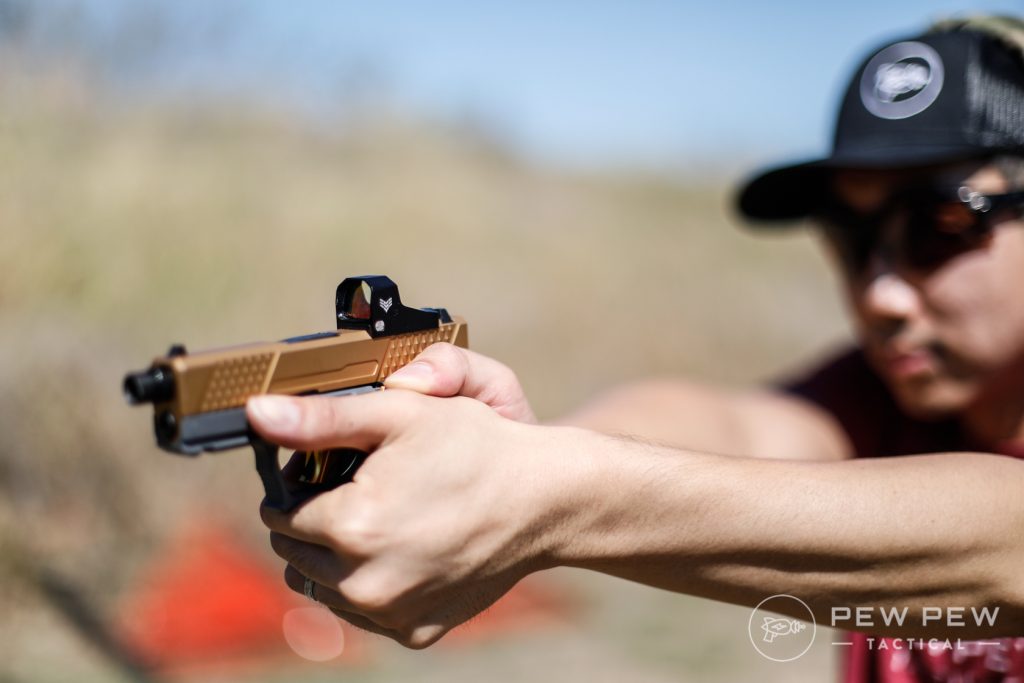
In Arizona, you may not purchase, own, or possess a gun if you:
- Are a fugitive from justice
- Are illegally or unlawfully in the United States
- Are in the United States on a non-immigrant visa
- Were dishonorably discharged from the U.S. military
- Have renounced your U.S. citizenship
- Unlawfully use or are addicted to any controlled substance
- Have been adjudicated as a “mental defective,” have been committed to any mental institution
- Have been convicted of or are under indictment for any crime punishable by imprisonment for a term exceeding one year
- Have been convicted of or are serving probation, parole, home arrest, community service, etc. for a:
- Felony
- Domestic violence misdemeanor
- Have been adjudicated as a juvenile delinquent for a crime that, if committed by an adult, would be a felony
- Are subject to any protective order that prohibits gun possession
- Are subject to a valid domestic abuse restraining order; or
- Are in prison
According to Arizona law, offenses that disqualify you from possessing a firearm include:
- Murder
- Manslaughter
- Aggravated assault resulting in serious physical injury via shooting, using, or “threatening exhibition” of a deadly weapon or “dangerous instrument”
- Burglary
- Armed robbery
- Kidnapping
- Sexual assault
- Sexual conduct with a minor
- Sexual exploitation of a minor
- Child molestation
- Child sex trafficking
- Continuous sexual abuse of a child
- Prostituting a child
- “Dangerous crimes” against children
- Arson
- Dangerous or deadly assault by prisoner
- Assault with intent to incite or participate in a riot
- Drive-by shooting
- Shooting at an occupied residential structure
- Gang or crime syndicate membership, assistance, or leadership
- Terrorism
- Unlawful introduction of a disease or parasite
Underage Gun Ownership
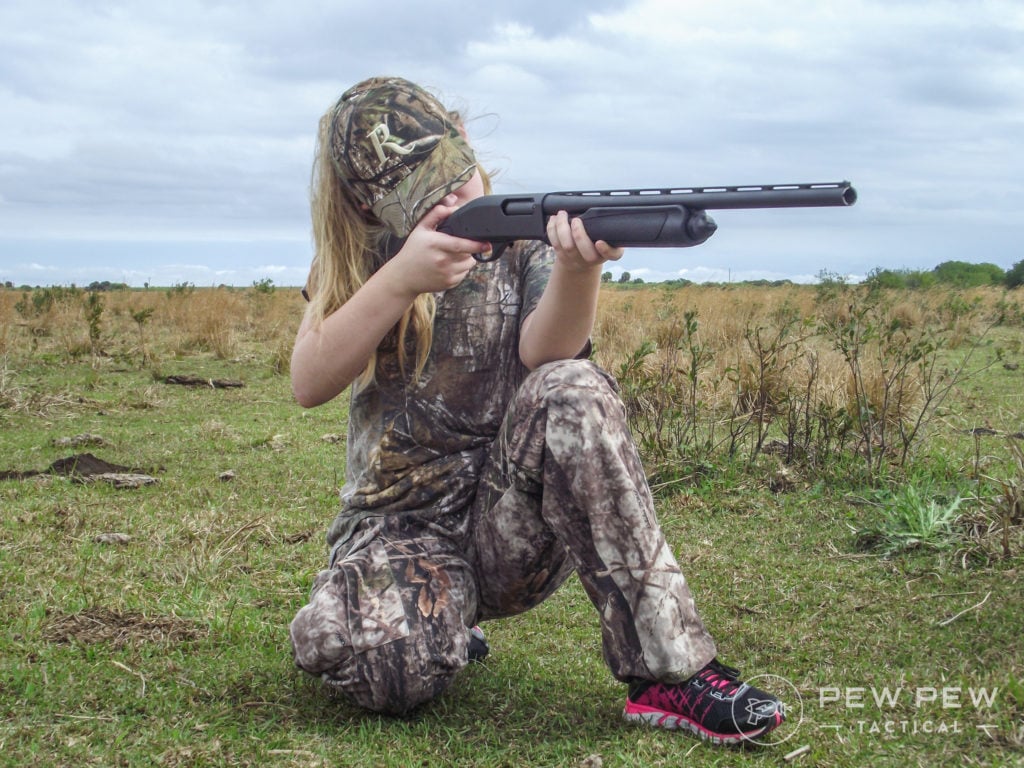
State law prohibits anyone from giving or selling any firearm to a minor without the written consent of the minor’s parent or legal guardian. It is also illegal for an unemancipated minor to possess or carry a firearm unless the minor is:
- Accompanied by a parent, grandparent, or guardian
- Accompanied by a certified hunter safety instructor or certified firearms safety instructor with the consent of the minor’s parent or guardian; or
- 14 to 17 years old and is lawfully:
- Hunting or transporting an unloaded firearm for hunting purposes
- Competing in a shooting event
- Practicing marksmanship at an established range or other legal shooting area
- Transporting an unloaded firearm between 5:00 am and 10:00 pm to a shooting competition or to a marksmanship practice session at an established range or other legal shooting area; or
- Engaged in an agriculture-related activity that requires a firearm
Safe Storage & Child Access Prevention Law
Arizona law does not require firearms to be stored in any particular manner. That said, please use common sense and keep your guns inaccessible to untrained children and irresponsible adults.
The state does hold parents and guardians liable if a minor in their care misuses or illegally carries or possesses a firearm without their consent if they:
- Should have known the minor would misuse or illegally carry or possess the firearm; and
- Made no effort to prevent the situation
Firearm Registration Requirements
Arizona does not require gun owners to register their firearms.
Restrictions and Bans
Arizona does not restrict or ban ownership of any firearms, firearm types, magazines, or accessories except those already banned or restricted by federal law. If you want an AR-15 with a 50-round drum magazine, a bump stock, AND a forced reset trigger, the only laws holding you back are the laws of physics.
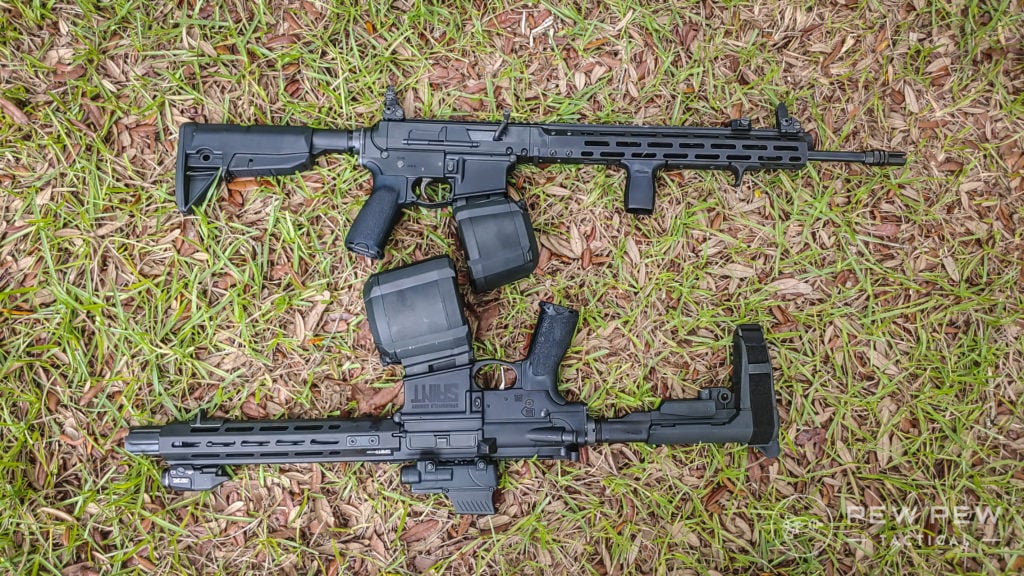
Purchasing a Gun
Dealer Purchasing
Once you meet all legal requirements for gun ownership, buying a firearm from your local Arizona gun store is as easy as it gets anywhere in the country.
Buying a Handgun
To buy a handgun in Arizona, you must:
- Be 21 or older (federal law)
- Meet all legal requirements for handgun possession
- Provide a state-issued driver’s license; and
- Submit to an instant background check
That said, you can avoid having to go through the background check each time you buy a gun if you present a valid CWP.
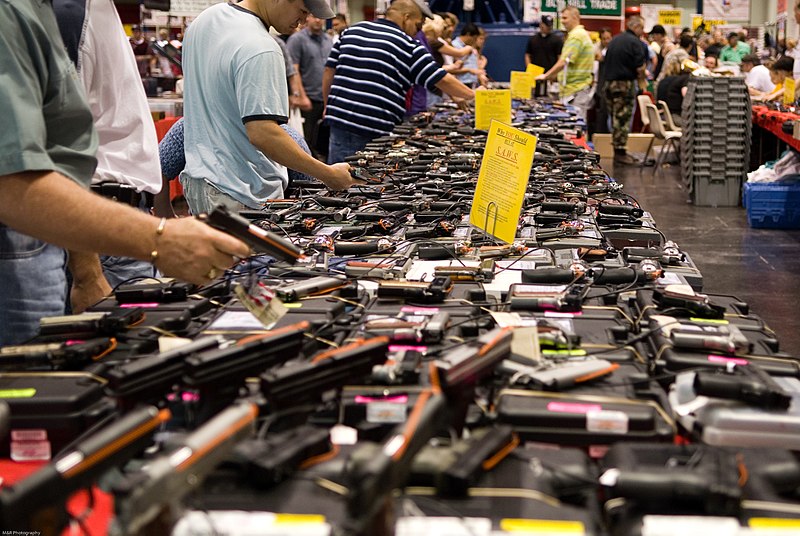
Buying a Long Gun
To buy a long gun, you must:
- Be 18 or older
- Meet all legal requirements for long gun possession
- Provide a state-issued driver’s license; and
- Submit to an instant background check.
Private Sales
Private gun sales and transfers are almost completely unrestricted in Arizona. No background checks are necessary; however, it is illegal to transfer ownership of a handgun to someone who isn’t legally eligible to possess a firearm.
The biggest advantage to private gun purchases belongs to individuals aged 18 to 20. Under Arizona law, you must be at least 18 to purchase any firearm, including a handgun.
You may not be eligible for a CWP just yet, but you could have up to three years of training and practice under your belt for when you finally obtain your first permit.
Military
Federal law requires licensed firearms dealers to accept PCS orders and a military ID as the equivalent of a state driver’s license or state ID in the state where you are stationed. Arizona does not have any perks or extra requirements for military members who wish to buy a gun.
Antiques and Heirlooms

Arizona has no special laws or regulations for antique firearms. State and federal law define an antique firearm as any matchlock, flintlock, percussion cap, or similar firearm manufactured before 1899 or a replica of such firearm that:
- Is not designed or redesigned for using rimfire or conventional centerfire fixed ammunition; or
- Uses rimfire or conventional centerfire fixed ammunition that either is no longer manufactured in the US or is not readily available on the US market.
Purchasing Ammo
Under federal law, you must be at least 21 to purchase handgun ammunition, but purchases for long gun ammo are legal for anyone 18 or older.
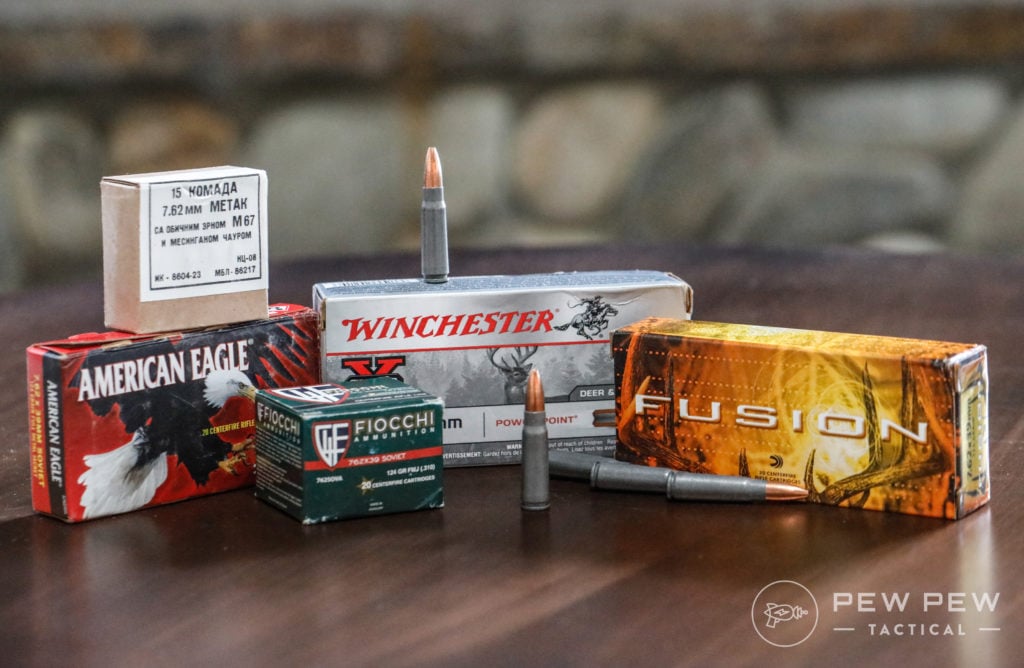
Arizona has one significant state restriction on who can make ammunition purchases. If you are under 18, you can buy ammo legally with the written consent of your parent or legal guardian.
Concealed Carry & Open Carry
Arizona is an incredibly gun-friendly state that embraces constitutional carry for anyone. This applies to both open and concealed carry and covers both residents and non-residents who abide by both state and federal gun laws.
Open Carry
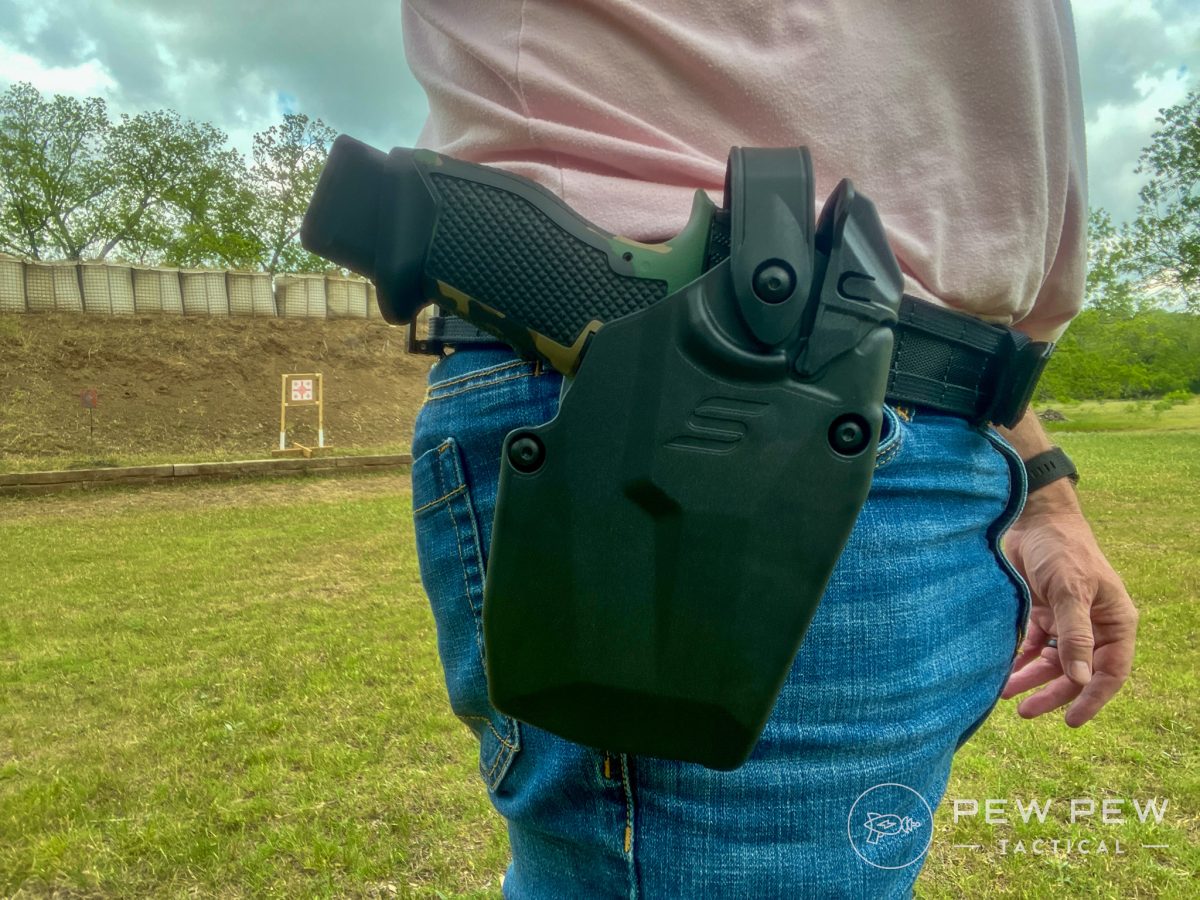
On the state level, Arizona generally permits open carry of a firearm, although you must be at least 18 and legally permitted to possess a firearm in order to carry.
Concealed Carry
In 2010, Arizona became one of the first states to institute constitutional carry. (The first was Vermont in 1793.) Arizona’s law applies to all residents and non-residents who are 21 or older and abide by state and federal law.
Arizona’s constitutional carry law negates the need for most state residents to obtain a Concealed Weapons Permit (CWP). That said, a CWP is worth it if you travel to other states that require a concealed carry permit and have reciprocity with Arizona.
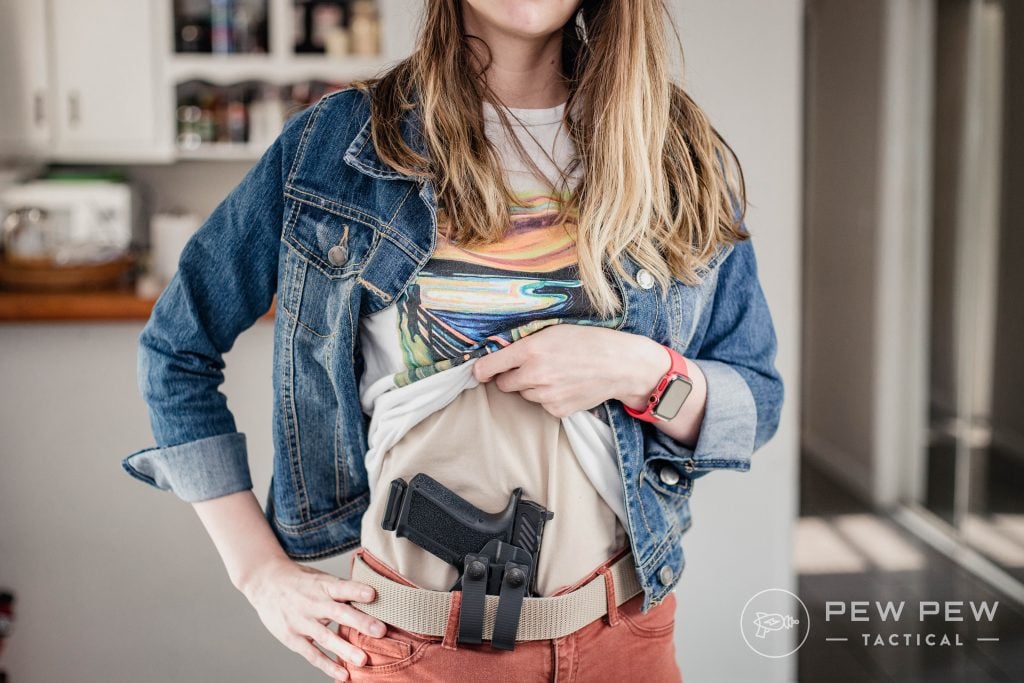
Getting Your CWP
To apply for an Arizona CWP, you must:
- Be a legal resident of Arizona OR a US citizen or legal resident
- Be at least 21 years old
- Be at least 19 years old if you have evidence of:
- Current military service
- Proof of honorable discharge
- General discharge under honorable conditions; or
- Veteran status
- Have any government-issued photo ID
- Not be under indictment for or convicted of a felony, unless:
- Your conviction has been expunged, set aside, vacated, or pardoned; or
- Your individual gun possession right has been restored and that right is not still prohibited under federal law
- Not suffer from mental illness
- Not have been adjudicated as “mentally incompetent” or committed to a mental institution
- Not be unlawfully in the US
- Complete a state-approved firearms safety course
- Provide two fingerprint cards with fingerprints taken by a qualified technician; and
- Have $60 for the application fee (no cash, personal checks, or business checks).
All checks must be made out to “Arizona Department of Public Safety.”
If you are a legal US resident but not a US citizen, you will also need to provide copies of your Green Card and proof of Arizona residency, which can include:
- An Arizona driver’s license
- An Arizona ID card; or
- Two documents from separate entities (bank statement, insurance policy, lease, utility bill, etc.) with:
- Your legal name as it appears on your state-issued driver’s license or ID card; and
- A physical address matching the address that appears on your CWP application
Training & Licensure Requirements
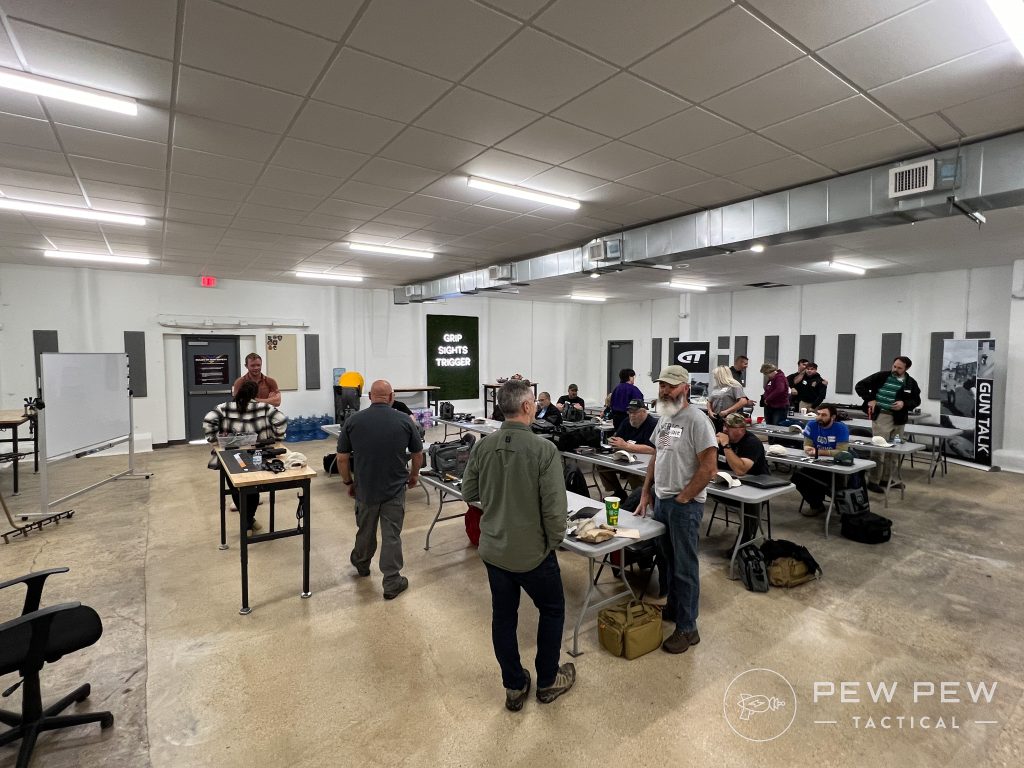
Arizona’s CWP training requirements are relatively lax compared to most states, but there are still requirements. To qualify for a permit, you must complete one of the following:
- A firearms safety or training course taught by DPS-approved or NRA-certified instructors and offered to the general public by a:
- Law enforcement agency
- Junior college
- Public or private college or university
- Public or private institution, academy, organization, or firearms training school
- A hunter education or hunter safety course approved by the Arizona Game and Fish Department or similar agency from another state
- An NRA firearms safety or training course
- A DPS-approved law enforcement firearms safety or training course for security guards, investigators, special deputies, or other similar organizations
- Evidence of current military service
- Proof of honorable discharge or discharge under honorable circumstances
- A valid current or expired out-of-state concealed carry permit that required a firearms safety or training course during the initial application process; or
- Completion of any other firearms safety or training course conducted by a DPS-approved or NRA-certified instructor
The Waiting Game
Once you’ve got everything squared away, you will need to submit your application to DPS. You can submit your application online, by mail, or in person. If DPS determines you made an error or forgot information, your application will be returned for you to correct.
You should hear within 75 days of submitting your application whether it was approved or denied. During that time, DPS will conduct a background check and determine if you are eligible for a permit.
If you are denied, you will receive a written notification detailing DPS’s reasons. You then have 20 days to appeal the decision and submit any additional documentation to DPS. The state then has 20 additional days to reconsider and issue a final decision. If you are denied again, you can request a hearing.
Along those lines, even if you have already been issued a permit, DPS can suspend or revoke your CWP if the department determines you no longer meet all permit requirements.
Since Arizona is a shall-issue state, DPS must issue you a CWP if you meet all the requirements. All CWPs are valid for five years.
Renewing Your CWP
About 60 days before your CWP expires, you should receive a renewal notice and renewal application form from DPS, but you can start the renewal process up to 90 days ahead of your permit’s expiration date.
There is also a 60-day grace period after your permit expires. After that, you will have to apply for a brand-new permit.
To renew your CWP, you must submit a renewal application along with a $43 renewal fee, and DPS will run another criminal background check. You can submit your application online or submit a paper application by mail or by walking it into the DPS Public Service Center in Phoenix.
US servicemembers whose CWP expires during deployment or Arizona National Guard members whose permit expires during active federal service will have an additional 90 days after the end of their deployment or federal service to renew their permit.
Any CWP Exceptions or Loopholes?
Constitutional carry is the biggest exception to any concealed carry permitting requirement.
Arizona does have one CWP “loophole” for retired law enforcement officers, thanks to the federal Law Enforcement Officers Safety Act of 2004 (LEOSA). In accordance with LEOSA, Arizona offers a Certificate of Firearms Proficiency, which functions like a CWP. You are a LEOSA-qualified retiree in Arizona if you:
- Are an Arizona resident
- Retired or separated in good standing for any reason other than mental instability
- Before retirement, were authorized to engage in prevention, detection, and prosecution and had powers of arrest
- Before retirement, were regularly employed for an aggregate of 10 or more years of commissioned service OR retired or separated after completing the probation period due to a service-connected disability as determined by the agency
- Have not officially been found to be mentally unqualified by a qualified medical professional employed by the agency
- Are not under the influence of alcohol or intoxicating or hallucinatory drugs or substances; and
- At your own expense, have met the state standard for training and qualification for active law enforcement officers to carry firearms within the last 12 months
If you are a LEOSA-qualified retiree who wants to obtain a Certificate, you must complete a qualifications exam with the firearm you intend to carry, including a “judgmental shooting evaluation.” Your exam must be administered by an Arizona Peace Officer Standard and Training (AZPOST) Board-certified instructor or a state-approved NRA instructor. To apply for your certificate, you must submit:
- A completed application (paper or online) with your qualifying instructor’s signature;
- A copy of your agency-issued photo ID credentials
- A letter from your agency on official letterhead, detailing:
- Your name
- Your badge number
- Your employment dates
- Your separation status; and
- Contact information for someone at the agency who can verify the accuracy of your information
- A $20 application fee; and
- Proof of citizenship (if you were born outside the US)
Fees must be submitted as a cashier’s check, certified check, or money order. Credit card payments are accepted when applying online or in person. Cash payments are not accepted.
An issued Arizona Certificate of Firearms Proficiency is valid for one year. To carry concealed, you must always have your agency-issued photo ID and Arizona Certificate of Firearms Proficiency on your person.
When renewing your Arizona Certificate of Firearms Proficiency, you will go through a streamlined version of the application process if your certificate never expired. You will only need to submit your signed application and the $20 renewal fee.
Prohibited Places
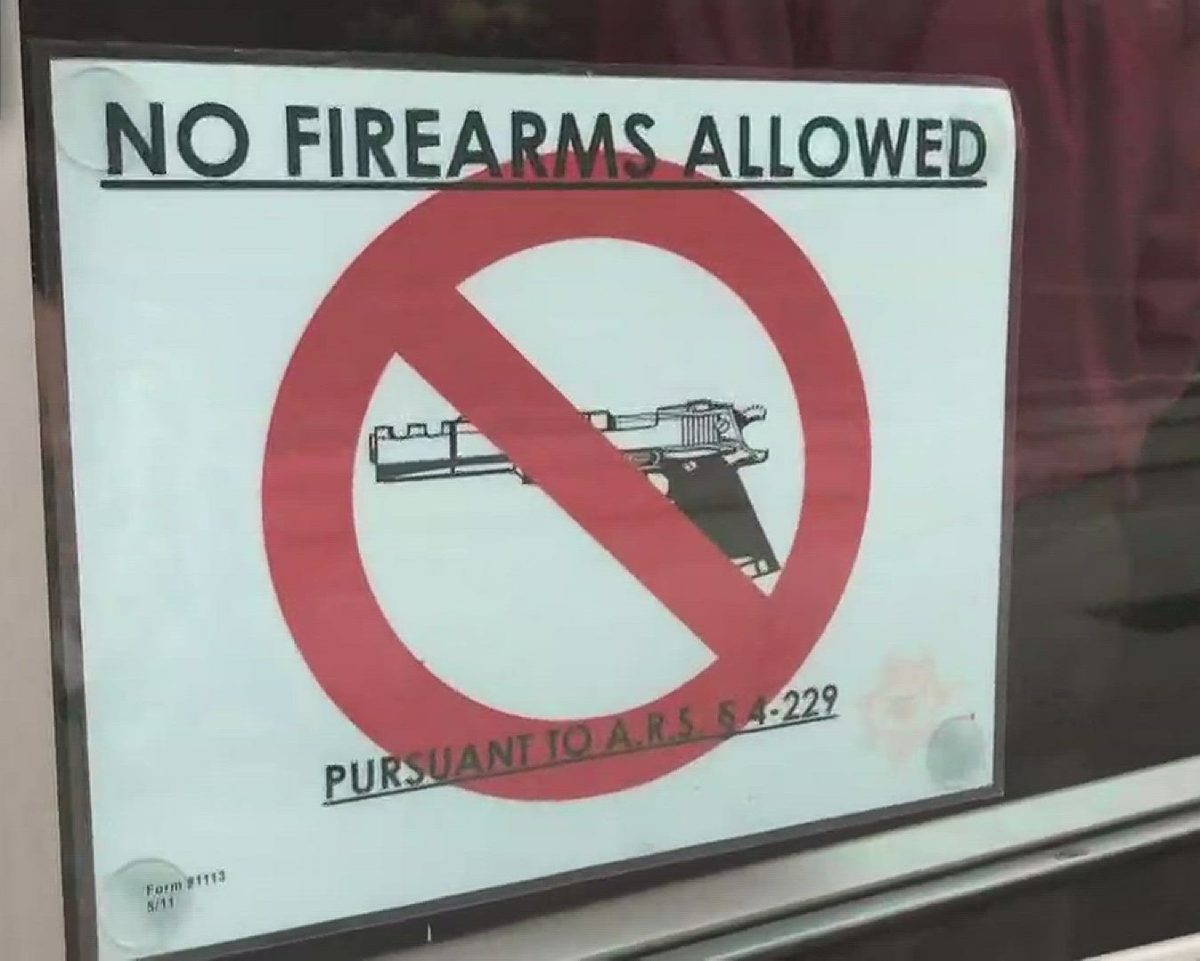
Even though open carry and concealed carry (with or without a CWP that is good statewide) are widely allowed, there are still places where you cannot carry a firearm. Specifically, Arizona prohibits handguns on or in:
- Private property with posted signs
- Private parking areas with fences, physical barriers, or other security measures, like a security guard, if the property owner provides a secure gun storage area near the building or facility’s entry/exit
- Any business licensed to sell alcohol (bar, restaurant, liquor store, or other retailer) that has a posted sign clearly prohibiting the possession of firearms on the premises, except if:
- The sign had fallen down
- You were not an Arizona resident at the time of your violation
- The sign had been posted for 30 days or less; or
- You are seeking emergency aid
- Public K-12 schools
- Public colleges and universities that have prohibited firearm carry on the premises
- Buildings hosting federal or state offices
- Federal property (except for outdoor spaces in national parks, national forests, etc.)
- Polling places on Election Day
- Nuclear or hydroelectric power stations
- Public establishments (buildings, vehicles, or craft that are government-owned, leased, or operated) or while attending public events after being reasonably asked to remove your firearm or temporarily store it in a secure on-site location
- Prisons, jails, correctional facilities, or juvenile secure care facilities
- Game preserves
- Secure areas in airports
- Any location prohibited by federal law
It is also illegal to carry any firearm while consuming alcohol on the premises of a business licensed to sell alcohol.
Other places also regularly ban firearms. These are determined on a case-by-case basis and don’t fall under state law. These places include:
- Native American reservations (under tribal law)
- Hospitals
- Places of worship
- Gambling facilities
It is perfectly legal to carry guns openly or concealed in national parks or national forests if you abide by state law. That said, you cannot carry in visitor centers, ranger stations, offices, or maintenance buildings, since these are all technically federal buildings.
If you do happen to visit a prohibited place, just leave your handgun in the car in accordance with state transportation storage laws.
Concealed Carry Reciprocity
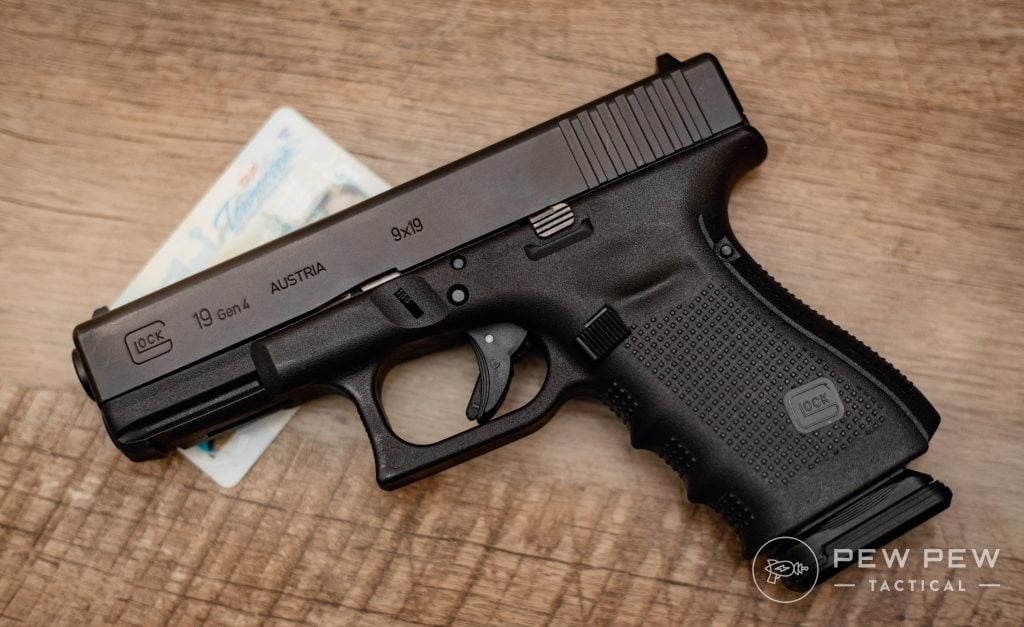
Most states allow Arizona CWP holders to carry concealed, although this is more due to constitutional (permitless) carry laws on the books rather than official reciprocity.
The age of eligibility varies by state, and the laws for permitless carry may differ from regular concealed carry laws, even within the same state.
Colorado, Michigan, New Mexico, Pennsylvania, Wisconsin, and Virginia also recognize Arizona CWPs; however, they have additional restrictions that you will need to know before carrying in either state. Colorado, Michigan, and Pennsylvania only recognize CWPs belonging to Arizona residents.
While most states recognize Arizona’s CWP (or don’t care about permits at all), there are still some that do not. An Arizona CWP is not recognized in:
- California
- Connecticut
- Hawaii
- Illinois
- Maryland
- Massachusetts
- Minnesota
- New Jersey
- New York
- Oregon
- Rhode Island
- Vermont
- Washington
- Washington D.C.
Note: You’ll want to take a look at our state gun law guides for whichever state you’re planning on visiting, just to familiarize yourself with the gun laws on carrying while out there, and be aware of the differences you might need to be careful of.
Always check the law in the state you’re traveling to before you carry there.
Carry Laws for Out-of-State Visitors
For those of you who already have CCW permits from other states, Arizona has you covered. The state recognizes every valid out-of-state permit. The only other requirements for out-of-state CCW permit holders are that you abide by Arizona’s gun and concealed carry qualification laws and are in the state legally.
Arizona’s constitutional carry law requires you to be 21 or older to carry without a permit and does not require you to be an Arizona resident. The only other requirements are that you abide by the state and federal gun laws and that you are in the state legally.
Transporting Your Guns
Arizona’s firearm transportation laws are very limited. If you are over 21, you can transport your firearm concealed anywhere in the vehicle, whether it’s loaded or unloaded. State law bans concealed carry of a firearm in (or on) a vehicle by anyone under 21.
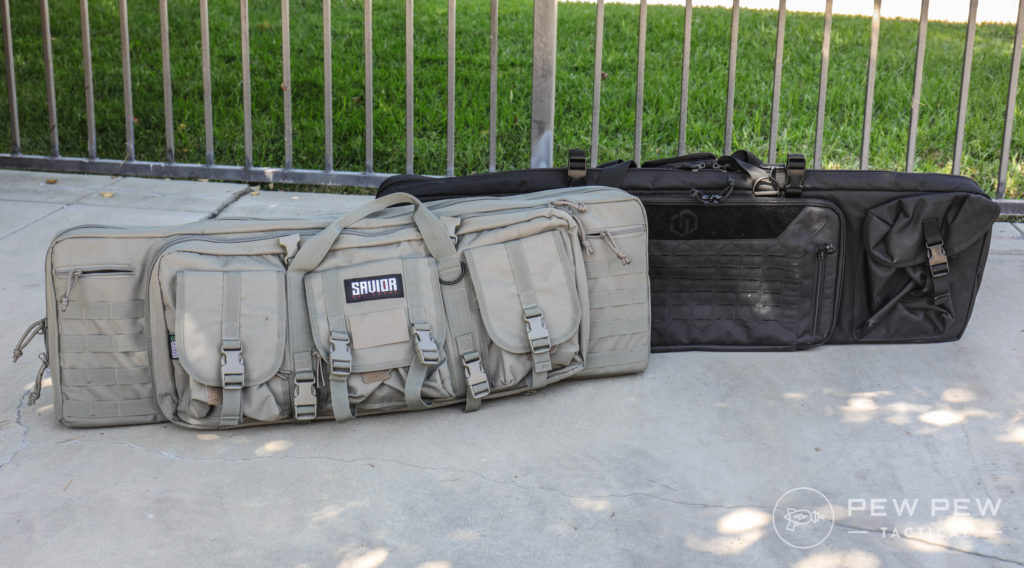
If you are 18 to 20, you must transport your gun either in plain sight (open carry), in a holster (concealed or not), or in an approved storage space out of reach of you and your passengers. You can only transport a loaded firearm if you open carry it. You may not conceal an unholstered firearm under your seat. Approved storage locations for 18 to 20-year-olds include:
- Case (locked or unlocked)
- Storage compartments (such as a console)
- Glove compartments
- Holsters
- Scabbards
- Luggage; or
- Packs
If you leave your firearm inside your vehicle for any reason, you must store your gun out of sight and completely lock the vehicle. You can do the same thing on school property (such as a school parking lot), your gun must also be unloaded.
In most cases, you are not required to inform a peace officer during a traffic stop that you are carrying a firearm. If, however, an officer detains you on reasonable suspicion that you are breaking the law, you must answer truthfully when he or she asks you if you are carrying a concealed firearm. You are not required to inform the officer of any other firearms located elsewhere inside the vehicle.
That said, transparency breeds trust. It’s usually best to inform a peace officer if you have a firearm within reach or in a location where he or she is likely to see or encounter it during the stop. This helps avoid a tragic situation involving you, your passengers, or the officer by nullifying potential surprises.
Just Passin’ Through: Native American Reservations
Due to the historical treaties between the US government and the various Native American tribes, each reservation has its own unique laws. As such, Arizona law does not override tribal law, and many reservations do not recognize Arizona’s constitutional carry law or Arizona CWPs.
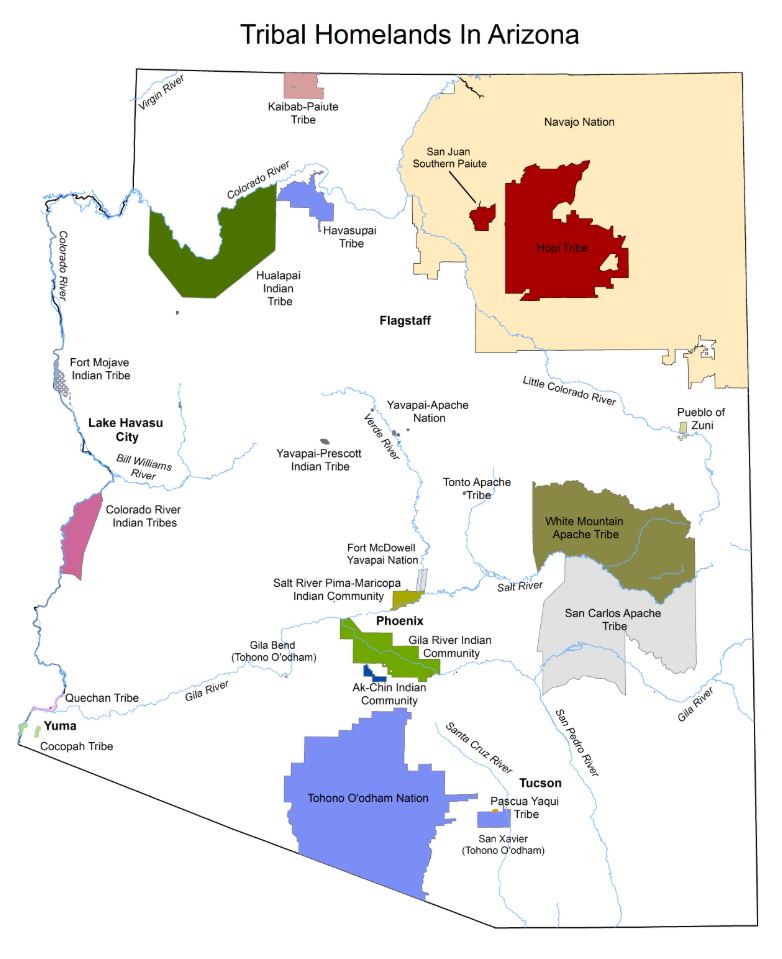
The federal Firearms Owners Protection Act (FOPA) makes it legal for you to transport any firearm through any Native American reservation (or state) as long as the gun is legal for you to own or possess both in your state of origin and your destination state. The key requirements are that you also abide by tribal firearm transportation laws and that you are actively “traveling” through the reservation.
The legal definition of “traveling” is a little hazy, and one law enforcement officer may not interpret the term the same as another. Some travelers report that simply leaving your firearm locked inside your vehicle is good enough on some reservations, but other tribes might interpret FOPA differently. Stopping for gas or a restroom break shouldn’t be an issue if your gun is unloaded and locked in the trunk or back seat, but we recommend checking tribal law before scheduling an extended meal with friends on the rez.
Self-Defense/Use of Force
When Is Lethal Force Allowed?
Aside from practicing at the shooting range, you hopefully will never need to fire your guns. If you are ever faced with a deadly threat to yourself or others, however, Arizona does allow for the use of deadly force in certain circumstances. That said, your use of force must always be proportional to the threat.
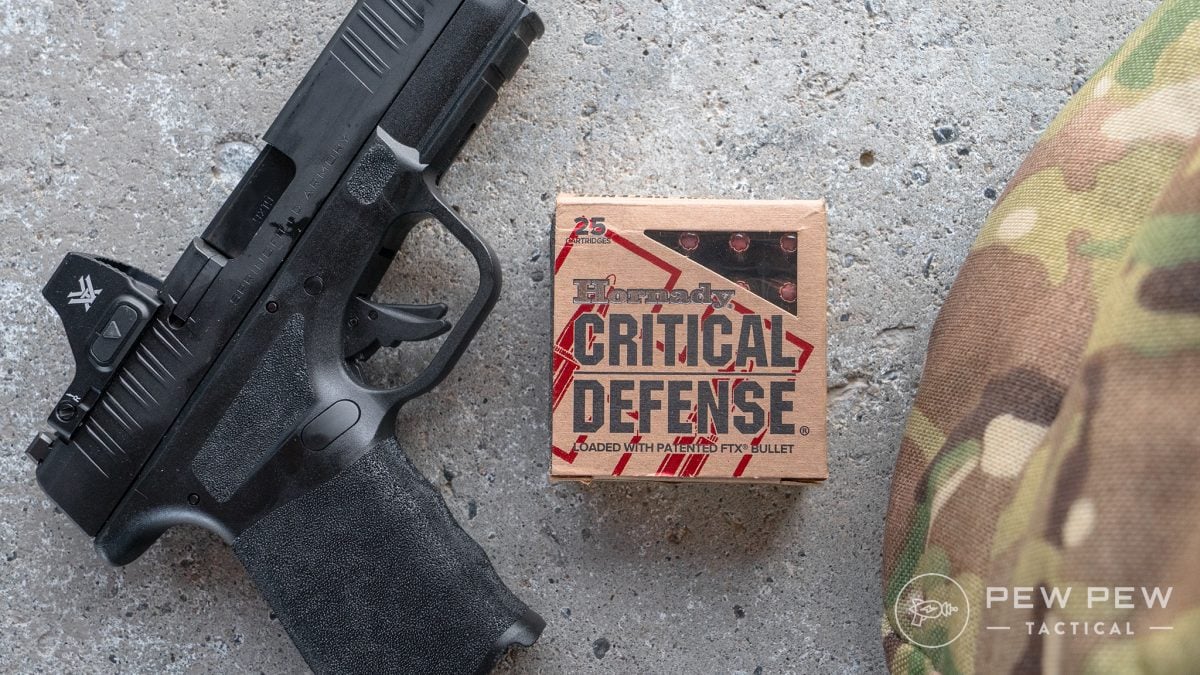
State law specifically protects your right to use or threaten physical or deadly physical force if you reasonably believe physical force is necessary to:
- Defend yourself against an aggressor who is using or will imminently use physical force against you; or
- Stop an aggressor who is committing or is imminently going to commit:
- First- or second-degree murder
- Manslaughter
- Sexual assault
- Sexual conduct with a minor
- Child molestation
- Kidnapping
- Aggravated assault
- Armed robbery
- Arson of an occupied structure (includes causing an explosion); or
- First- or second-degree burglary
All that said, there are limits. You cannot claim self-defense in Arizona if you:
- Are responding to a verbal provocation only
- Resisting arrest when you know or should have known the arrest is being made by a peace officer or someone acting in the officer’s presence and at his/her direction unless the officer’s physical use of force exceeds legal limits
- Provoked a fight with the aggressor to use unlawful physical force, unless:
- You withdrew from the initial confrontation OR clearly communicated your intent to withdraw from the initial confrontation and reasonably believe you cannot safely withdraw; and
- The aggressor continues or attempts to use unlawful physical force against you.
As an alternative self-defense option, Arizona law allows you to employ a “defensive display of a firearm” if you reasonably believe that unlawful or deadly physical force is imminent.
Sometimes, simply drawing your gun with a defensive posture or letting someone know you are armed can be enough to neutralize a threat without an actual shooting taking place. Of course, “defensive display” is no longer an option if you intentionally provoked your assailant or you are committing a serious or violent crime.
Castle Doctrine
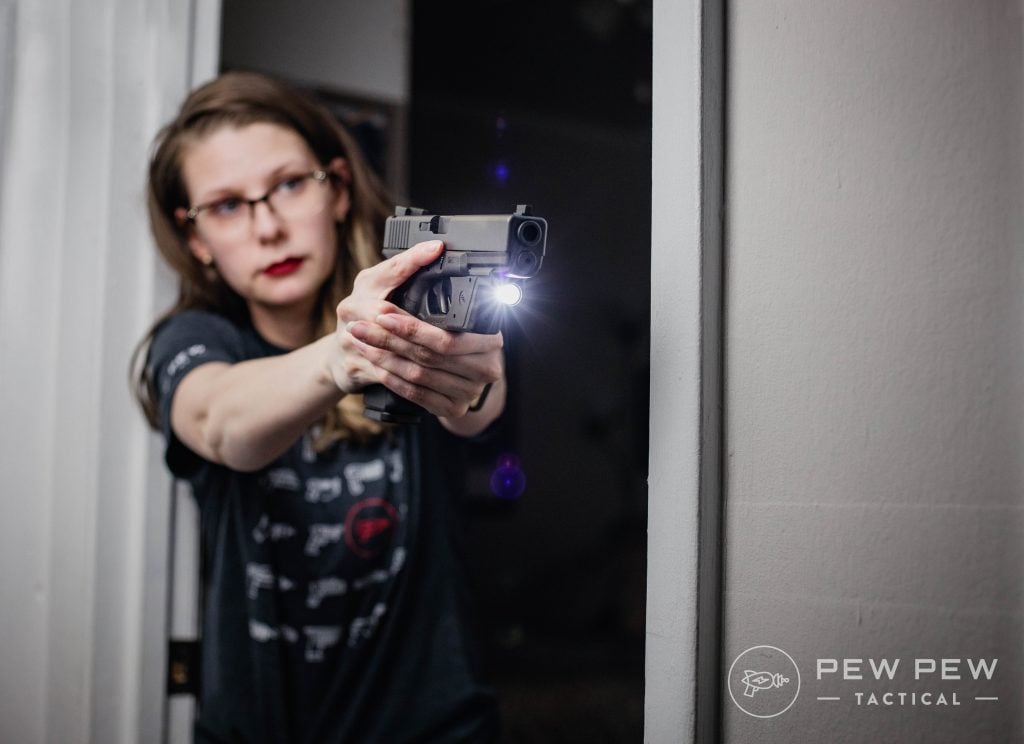
In Arizona, your home is your castle. Under what is commonly known as the “Castle Doctrine,” you can defend yourself when you’re at home or on your property. You are justified in using or threatening physical force, including deadly physical force, against an aggressor when you reasonably believe physical force is necessary to neutralize a threat to you or someone else in your home or on your property.
Standing Your Ground/Duty to Retreat
Arizona is a Stand Your Ground state that protects your right to self-defense in any place where you have the right to be, including your home, place of business, private property, and vehicle. There is no duty to retreat, but your use of force must be proportional to the threat.
Of course, even with all these laws on self-defense, you should always use your best judgment to decide what type of force is appropriate. Just because you are allowed to use deadly force doesn’t mean you have to.
Taking any life is always a serious decision and may not always be necessary in order to end a threat to you and your loved ones.
Final Thoughts
And on that happy note, we’re done! If you’re lucky enough to live in the Grand Canyon State, it’s time to buy a gun (or three). Buy as many as you can and start punching holes in paper!
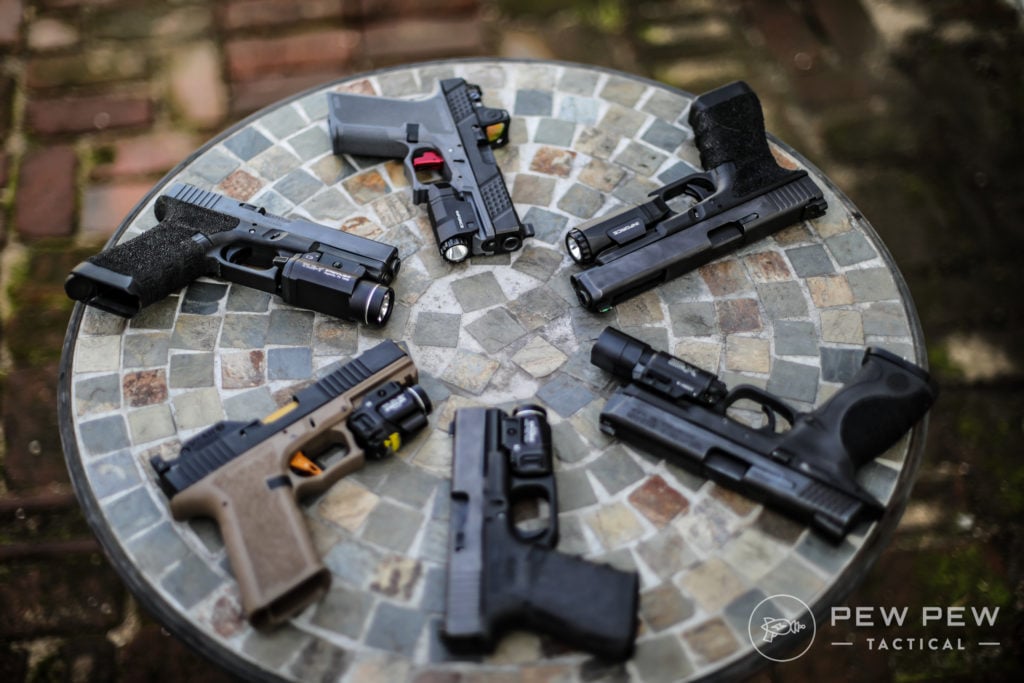
Of course, you’ll need a place to store all those guns. A sturdy safe can keep your guns from prying eyes and curious kids. If you want to start smaller, a gun cabinet, or even just a decent handgun safe may be a good investment. Getting proper training with your firearms is a good idea, too. Happy shooting!




